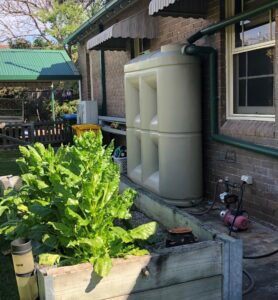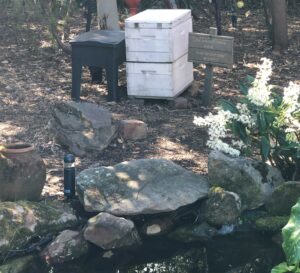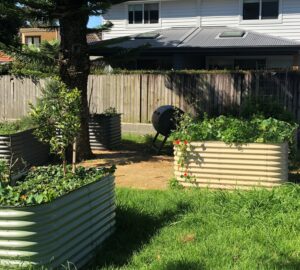How to use this kit
This page provides some guidance and tips on how to get active around environmental issues in your parish. Ideally, a group would start off with at least half a dozen members committed to meeting regularly, say once a month. The format can be to start with prayers and then move to planning activity together. Example prayers and actions are provided below. When you are ready to get started, speak to your parish priest or contact the Justice and Peace Office.
Catholic Social Teaching on the environment
What are the sources of Catholic Social Teaching on the environment? Many Catholics know about the 2015 encyclical Laudato Si’ however the message of caring for creation has been part of Catholic teaching since before then; it can be found in Scripture, in older documents issued by the Church’s teaching magisterium, and in the living tradition as articulated by the Saints.
-
Scripture
“the lord God took the man and put him in the Garden of Eden to till it and keep it” – Genesis 2:15 This passage emphasises the CST principle, “the stewardship of creation,” as it highlights humans’ importance in caring for the earth.
“For the Lord your God…loves the stranger, providing them food and clothing. You shall also love the stranger, for you were strangers in the land of Egypt.”- Deuteronomy 10:18-19 This teaching reflects the CST principle, “preferential Option for the poor”, which calls for us to show compassion towards those seeking refuge.
“The righteous know the needs of their animals, but the mercy of the wicked is cruel”-Proverbs 12:10 This scripture demonstrates the CST principle, “the stewardship of creation,” as it emphasises the importance of compassionate care for all creatures, protecting the biodiversity and wellbeing of all living beings, and avoiding cruelty and exploitation towards animals.
“For six years you shall sow your land and gather in its yield; but the seventh year you shall let it rest and lie fallow, so that the poor of your people may eat; and what they leave the wild animals may eat”-Exodus 23:10-11 This reading reflects the CST “the stewardship of creation and preferential Option for the poor” as it emphasises the importance of sustainable agriculture and responsible land management, considering the needs of the poor and vulnerable.
-
Writings of the Saints
-
St Ambrose
“The Earth is the Lord’s, not ours; and all things in it belong to everyone, not to the rich.” – St. Ambrose. St. Ambrose emphasises that the earth and its resources belong to God and should be shared by all, not just the privileged. Therefore, this quote promotes the common good and the importance of serving the needs of all, especially the poor and marginalised.
-
St Gianna Beretta
“Let us thank God for having placed us in such a beautiful world!”-St. Gianna Beretta Molla (an Italian physician and mother with a deep appreciation for the beauty of the world) This quote highlights the importance of recognising and valuing the beauty and goodness of God’s creation and reminds us to care for it as stewards.
-
St Francis of Assisi
“Praise be to you, my Lords, through our Sister, Mother Earth, who sustains and governs us, and who produces various fruits with coloured flowers and herbs.”- St. Francis of Assisi, Canticle of the Sun. This quote reflects the beauty and interconnectedness of all creation.
“The environment is our common home, and all of us are brothers and sisters. If we destroy the environment, it will destroy us in return.”-St. Francis of Assisi This quote reflects the CST principle of solidarity, emphasising the interconnectedness of all people and creation and stewardship of creation as it highlights our responsibility to care for the environment for the wellbeing of all.
“If you have men who will exclude any of God’s creatures from the shelter of compassion and pity, you will have men who will deal likewise with their fellow men”-St. Francis of Assisi This quote demonstrates many CST principles as it recognises the interconnectedness (solidarity), the need to care for all creatures (stewardship for creation) and the most vulnerable among us (Preferential option for the poor).
-
Church documents
-
Catechism of the Catholic Church (1992)
“It is necessary to cultivate ecological awareness and to promote a ‘ecological conversion’, which entails moving away from a purely consumerist mentality to a mentality of solidarity, concerned for the common good, and attentive to the needs of the poor.” (CCC 2192) This statement calls for stewardship of creation by shifting from a consumerist mentality to one grounded in solidarity and concern for the common good, including the needs of people experiencing poverty, as it highlights the interconnectedness between care for the environment and social justice.
“The use of natural resources, especially water, oil, and forests, must be measured by a concern for the benefit of all, including future generations; it is legitimate to insist on respect for the laws of the environment gravely disturbed by human intervention.” (CCC 2415) This statement recognises humans’ severe impact and the need to respect the environment. It highlights the importance of using natural resources wisely and being guided by the concern for the common good, such as the well-being of future generations.
“Man’s dominion over inanimate and other living beings granted by the Creator is not absolute; it is limited by concern for the quality of life by his neighbor, including generations to come; it requires a religious respect for the integrity of creation.” (CCC 2415) This statement highlights the importance of humanity exercising dominion of creation in a way that is not absolute but instead guided by a concern for the well-being of others.
“The seventh commandment enjoins respect for the integrity of creation. Animals, like plants and inanimate beings, are by nature destined for the common good of past, present, and future humanity.” (CCC 2415) These statements highlight the interconnectedness of all creation and the need to care for it as stewards, which is following the seventh commandment, which prohibits stealing and calls for respect for the poverty of others both now and in the future.
“Respect for the environment, then, means that man should use the earth’s resources for the benefit of everyone, always with the interest of future generations in mind.” (CCC 2456) “The environment is a gift of God to everyone, and in our use of it we have a responsibility towards the poor, towards future generations and towards humanity as a whole.” (CCC 2452) This statement demonstrates the principle of preferential option for the poor as it highlights our responsibility towards the environment and includes consideration for the poor, future generations and humanity, as the impact of environmental degradation often falls disproportionately on the poor and vulnerable.
-
Laudato Si’ (2015)
“We are not God. The Earth was here before us, and it has been given to us” – Laudato Si’, 67 This quote reflects the principle of stewardship of creation as it emphasises the responsibility of humanity to care for and protect the Earth as it is a gift of God rather than exploiting it.
“We are faced not with two separate crises, one environmental and the other social, but rather with one complex crisis which is both social and environmental.”-Laudato Si’, 139 This quote emphasises how the environmental and social crises are interconnected and call for an integrated approach to address both areas of the crisis.
“The Earth, our home, is beginning to look more and more like an immense pile of filth.”-Laudato Si’, 21 This quote highlights the urgent JJN need to address environmental degradation and pollution harming the planet and CST’s stewardship of creation.
“The Climate is a common good, belonging to all and meant for all.”-Laudato Si’,23 This quote emphasises the interconnectedness of creation and the principle of the common good. Our moral responsibility is to protect and care for the environment, as it affects everything, especially the poor and vulnerable.
“All of us can cooperate as instruments of God for the care of creation, each according to his or her own culture, experience, involvements and talents.”-Laudato Si’,14 This quote calls for solidarity and collective action, and participation in caring for the environment from everyone using their unique talents and experiences.
-
Bishops statements
“the degradation of the environment is closely linked to the human, ethical and social that we experience.”-Bishop Miguel Ayuso Guixot (Secretary of the Pontifical Council for Interreligious Dialogue). This quote highlights that care for the environment is closely linked to the well-being of humanity and the need for integrating ecological and social justice.
“The call to care for creation goes to the heart of what it means to be human before God and in the world. It requires a profound conversion expressed in new ways of living, both personally and collectively. (Australian Catholic Bishops Social Justice Statement 2021-22). In this statement the Catholic bishops of Australia affirm the need for people of faith to re-examine their way of living.
Ecospirituality
Ecosprituality is a term that combines ecological awareness with spiritual and religious beliefs and practices. It emphasises the interconnectedness of all living beings and the importance of stewardship and responsibility towards the gift of God’s creation. Ecosprituality may involve actions like advocating for environmental justice and practices that recognise the social dimension of environmental issues, such as the need for social justice and care for the poor and vulnerable. It is important that any Catholic Care of Creation group integrate elements of ecospirituality, as the concern for creation is wound up in our beliefs about our place in God’s creation. It’s also important for church-based groups not to be coercive about action on Care of Creation and instead be ‘invitational’ to others to come along on the journey.
- Jesuit and Ignatian Spirituality Australia offer ecospirituality retreats that can be attended online or in-person at Peter Canisius House in Pymble.
Prayers
Prayer of creation from Pope Francis’ encyclical Laudato Si’:
All-powerful God, you are present in the whole universe and in the smallest of your creatures. You embrace with your tenderness all that exists. Pour out upon us the power of your love, that we may protect life and beauty. Fill us with peace, that we may live as brothers and sisters, harming no one. O God of the poor, help us to rescue the abandoned and forgotten of this earth, so precious in your eyes. Bring healing to our lives, that we may protect the world and not prey on it, that we may sow beauty, not pollution and destruction. Touch the hearts of those who look only for gain at the expense of the poor and the earth. Teach us to discover the worth of each thing, to be filled with awe and contemplation, to recognize that we are profoundly united with every creature as we journey towards your infinite light. We thank you for being with us each day. Encourage us, we pray, in our struggle for justice, love and peace.
Father of all, Creator and ruler of the universe, You entrusted your world to us as a gift. Help us to care for it and all people, That we may live in right relationship – With You, With ourselves, With one another, And with creation. Christ our Lord, both divine and human, You lived among us and died for our sins. Help us to imitate your love for the human family By recognizing that we are all connected – To our brothers and sisters around the world, To those in poverty impacted by environmental devastation, And to future generations. Holy Spirit, Giver of wisdom and love, You breathe life in us and guide us. Help us to live according to your vision, Stirring to action the hearts of all— Individuals and families, Communities of faith, And civil and political leaders. Triune God, help us to hear the cry of those in poverty, and the cry of the earth, so that we may together care for our common home. Amen Source: Our Common Home
Taking action
Personal
We are all called to examine our own life. Some ways we can do this are:
Conserve Resources: Be mindful of natural resources such as water, electricity, and food. Make sure these resources are used efficiently, and waste is avoided.
Responsible Consumption: Making an informed decision about purchases.
- Reduce the use of single-use plastics such as disposable plates, cutlery, single-use straws, utensils, cups etc.
- Select products with minimal packaging or reusable, such as water bottles, coffee cups, and shopping bags.
- Purchase environmentally friendly products that are non-toxic, biodegradable, and avoid chemicals that could harm the environment, e.g., cleaning.
- Support local, organic, fair-trade, and sustainably produced goods.
Support more sustainable food systems:
- Reduce your consumption of meat and animal products, or choose plant-based diets.
- Practice responsible food consumption and food waste reduction and support local and organic food systems.
Educate yourself and others: Be updated and aware of environmental and social issues and solutions. Educate yourself and others about the importance of environmental sustainability by attending workshops, articles and educational campaigns.
Practice environmental stewardship: Take care of your local environment by participating in clean-up efforts, supporting conservation and restoration initiatives, and promoting responsible environmental practices in your local community.
Local
Catholic parishes have a role to play locally. This is best carried out if there is a small standing group or committee for Care of Creation, rather than relying on individuals to carry the burden. As a first step, speak to your parish priest about your interest in forming a local group. The Justice and Peace Office can guide you through the steps to set up a first meeting. Role and scope of parish groups
Environmental education:
- Offer educational programs, workshops, and discussions that raise awareness of environmental and social issues that can empower individuals and communities to take action.
- Provide resources and information on environmental and social issues, ecological practices, and sustainable living, and emphasize the moral and spiritual imperative of caring for the Earth through a website or social media platform.
- Invite environmental experts or local practitioners of eco-friendly practices to share their knowledge and experiences.
Promotion of ecospirituality:
- Creation-centred worship
Comprise creation-centred worship practices in regular religious services, such as prayer, blessing and rituals that accept and honour the interconnectedness of all living beings and gods creation. Incorporate readings and sermons that emphasise environmental teachings, and encourage members to reflect on their relationship with nature and their responsibility as stewards of god’s creation.
- Advocacy and Policy engagement
Engaging in advocacy efforts to promote policy changes and practices that support the environment and those living in poverty at a local, regional and national level and by collaborating with the local government, businesses, and other stakeholders can have a significant impact. Parish groups can organise delegations, either from within the parish or including other faith communities, to meet with local councillors and local MPs and advocate for environmentally sustainable public policies.
Practical local actions relating to the environment:
Waste management system: This may be achieved by:
- Setting up recycling bins around the community, Implementing a composting program to reduce food waste and creating nutrient soil
- Creating a community exchange program for sharing items, such as tools and books, to promote resource sharing and reduce resource consumption.
- Providing water bottle refill stations to discourage the use of disposable water bottles. Reducing consumption, reusing items and recycling can significantly reduce the negative impacts of waste.
Sustainable transportation:
- Encouraging public transportation, carpooling, biking, and walking can reduce greenhouse gas emissions and air pollution.
- Communities can help create designated carpool or rideshare programs for events to make it easier for people to choose sustainable transportation options.
- A parish goal might be, how can we reduce the number of cars driving to each Sunday mass?
Energy Conservation and Efficiency:
- Implementing energy-saving measures, such as energy-efficient lightbulbs, sensor lights, timers or programmable thermostats to optimise heating and cooling systems, can help reduce energy consumption and lower greenhouse gas emissions.
- Communities can also explore renewable energy options like roof-top solar panels and wind turbines.

Water conservation:
- Encouraging water-saving practices, such as fixing leaks or installing rainwater tanks
- Water-efficient appliances such as installing low-flow faucets, toilets, and showerheads can help conserve water resources.

Green spaces:
- Create green spaces through community gardens or a wild-life-friendly garden with native plants that will help reduce carbon emissions.
- Install bird feeders, nesting boxes, bird baths, butterfly gardens or bee farms on the grounds to promote biodiversity and support local wildlife.

Conservation and restoration of natural resources: Organising volunteer activities in the local community, such as habitat restoration, clean-ups and tree planting, can assist in protecting and restoring the local ecosystem.
Other possible actions:
- Foster partnerships with local indigenous communities to learn from their traditional ecological knowledge and promote their cultural practices of sustainability and stewardship of the land.
- Consider ways to reduce meat products at parish events.
Practical local actions relating to the poor Laudato Si’ makes it clear that ecological concerns are integrally related to ‘human’ concerns. Francis calls this integral ecology. Mining, for example, is intimately connected with First Nations land stewardship.
- Community gardens:
Creating community gardens will promote sustainable agriculture and provide fresh, healthy produce for low-income and vulnerable families.

- Support local charities
Many charities and non-profit organisations are working to support impoverished people. By donating money, volunteering and participating in fundraising events, you can support these organisations and the people impacted daily by extreme poverty and injustice.
- Local food drive:
Organising a food drive in your local parish will help encourage people in your community to donate non-perishable food items and assist people living in poverty struggling to put food on the table.
- Volunteer at a homeless shelter
Homelessness is a significant issue affecting many impoverished people. Volunteering at a local homeless shelter and helping to provide clothing, meals, and other necessities can help make a difference.
- Offer pro-bono services
Consider offering your services for free to low-income individuals or non-profit organisations working to support these individuals if you have a professional skill or expertise.
- Tutor or mentor low-income students
Many students from low-income families struggle in school due to a lack of resources and support. Volunteering as a tutor or mentor can provide academic assistance and guidance.
Global
There are organisations dedicated to protecting the environment and God’s creation. You can support these organisations by donating, volunteering and spreading awareness of their work and course.
Partner environmental organisations There are many environmental organisations doing good work. The Justice and Peace Office works in cooperation with the following four organisations that are active in Sydney and can connect your group if you want to get involved in a campaign beyond your local parish. They each have a slightly different focus:
- Sweltering Cities – aim to lessen the impacts of climate change such as more frequent flooding and high temperatures
- Australian Conservation Foundation – focus on saving the natural environment, at a national level
- World Wide Fund for Nature – have a campaign, Regenerate Australia, that is about restoring natural habitats
- Solar Citizens – seek transition to renewable energy
Links
Want to connect up with others who are getting active around care of creation? There are local and international Laudato Si’ networks:
- Laudato Si’ and ecology resources for parishes put together by Caritas Australia. Scroll down past the email sign-up form and you will see the resources available.
- Catholic Earthcare: This is an Australian network that encourages local groups. Catholic Earthcare is an agency of the Australian Catholic Bishops Conference. Catholic Earthcare is put together with the Australian context in mind and is the best starting place for Australian-based groups.
- Laudato Si’ Action Platform: This is a global network headquartered in the Vatican that also offers resources for parish groups who can enrol directly and receive updates and support. The Archdiocese of Sydney is enrolled at the diocesan level.
